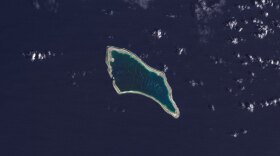The nations of the world are gathering in Paris, ahead of the United Nations Conference on Climate change which gets underway next week. News analyst Neal Conan is also there, to cover the conference with a focus on Pacific Island Nations. As we hear in today's Pacific News Minute, countries which have contributed very little to the problem face enormous challenges as a result of it.
The stated goal of this conference is to contain global warming to less than two degrees Celsius by the end of this century. A number calculated from the start of the industrial revolution when humans started to put carbon into the atmosphere on a large scale. Even if that's achievable, many Pacific Islanders believe it's not enough.
In the Pacific, the advent of the industrial revolution meant the arrival of explorers, traders, and whalers from Europe and the United States - harbingers of profound economic, military, political, religious and cultural change. The ships carried disease, colonialism, and slavery. And in the 20th century, they brought a war that devastated some places and transformed much of the rest.
While the United States, France, Japan and now China wield enormous influence and in some places, control - most Pacific Islands have achieved a large degree of political independence. Australia and New Zealand aside, many struggle with fundamental issues of legitimacy, governance, poverty, exploitation and corruption.
All of these islanders now face stronger and more frequent storms, bleaching reefs and rising tides that threaten to swallow some low lying atolls and some entire nations before this century is out. They want the world to set the goal not at two degrees Celsius - but at 1.5 to provide funds to help them adapt and if necessary, to relocate, to be accepted as equals who suffer unequally from a problem they had no part in creating.





